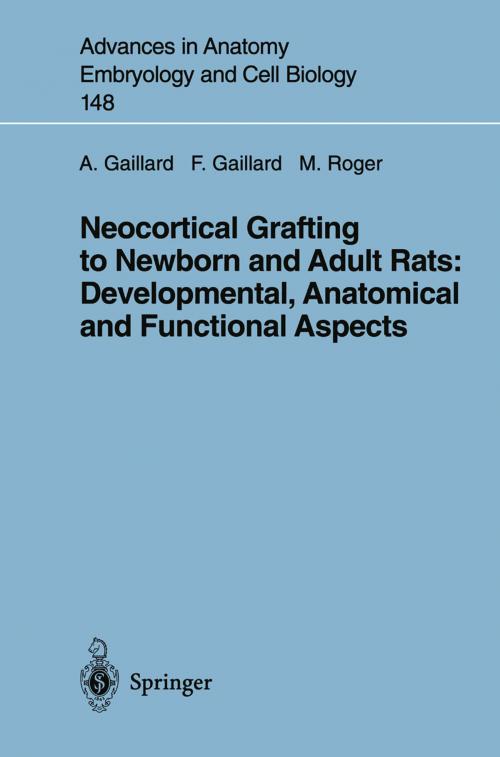Neocortical Grafting to Newborn and Adult Rats: Developmental, Anatomical and Functional Aspects
Nonfiction, Science & Nature, Science, Other Sciences, Molecular Biology, Health & Well Being, Medical, Specialties, Internal Medicine, Neuroscience| Author: | Afsaneh Gaillard, Frederic Gaillard, Michel Roger | ISBN: | 9783642721793 |
| Publisher: | Springer Berlin Heidelberg | Publication: | March 12, 2013 |
| Imprint: | Springer | Language: | English |
| Author: | Afsaneh Gaillard, Frederic Gaillard, Michel Roger |
| ISBN: | 9783642721793 |
| Publisher: | Springer Berlin Heidelberg |
| Publication: | March 12, 2013 |
| Imprint: | Springer |
| Language: | English |
The first experiments with neural transplantation into the brain (for a review, see Bjorklund and Stenevi 1985) were reported at the end of the last century by Thompson (1890), who took cortical tissue from adult cats and implanted the tissue pieces into the neocortex of adult dogs. The neurons did not survive, but the transplanted mass did not disintegrate entirely. Successful graft ing into the brain was reported later by Ranson (1909), who implanted spinal ganglia into the cerebral cortex of developing rats, and by Dunn (1917), who reported survival of implanted neonatal cortex into the cortex of newborn recipients. Another important step was made by Le Gros Clark (1940) who reported that, in the rabbit, embryonic (E) cortical tissue could be successfully grafted into the cortex of young recipients. Ex periments by Wallace and Das (1982), and Bjorklund and Stenevi (1984), showing behavioral effects of grafts, subsequently stimu lated a growing interest in neurotransplantation research. Intrac erebral grafting is now considered a powerful tool for addressing fundamental questions about development, regenerative, or re storative phenomena in the central nervous system (CNS) and is a potential therapy for neurodegenerative diseases.
The first experiments with neural transplantation into the brain (for a review, see Bjorklund and Stenevi 1985) were reported at the end of the last century by Thompson (1890), who took cortical tissue from adult cats and implanted the tissue pieces into the neocortex of adult dogs. The neurons did not survive, but the transplanted mass did not disintegrate entirely. Successful graft ing into the brain was reported later by Ranson (1909), who implanted spinal ganglia into the cerebral cortex of developing rats, and by Dunn (1917), who reported survival of implanted neonatal cortex into the cortex of newborn recipients. Another important step was made by Le Gros Clark (1940) who reported that, in the rabbit, embryonic (E) cortical tissue could be successfully grafted into the cortex of young recipients. Ex periments by Wallace and Das (1982), and Bjorklund and Stenevi (1984), showing behavioral effects of grafts, subsequently stimu lated a growing interest in neurotransplantation research. Intrac erebral grafting is now considered a powerful tool for addressing fundamental questions about development, regenerative, or re storative phenomena in the central nervous system (CNS) and is a potential therapy for neurodegenerative diseases.















